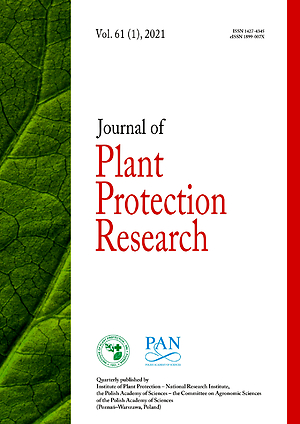ORIGINAL ARTICLE
Characterization of Turkish isolates of Pseudocercospora griseola the causal agent of angular leaf spot of common beans
1
Department of Phytopathology, Ankara Plant Protection Central Research Institute, Ankara, Turkey
2
Department of Plant Protection, Faculty of Agriculture, Ankara University, Ankara, Turkey
A - Research concept and design; B - Collection and/or assembly of data; C - Data analysis and interpretation; D - Writing the article; E - Critical revision of the article; F - Final approval of article
Submission date: 2020-07-07
Acceptance date: 2020-08-24
Online publication date: 2021-03-12
Corresponding author
Sirel Canpolat
Department of Phytopathology, Ankara Plant Protection Central Research Institute, Gayret Mah. FSM Bul. No:66, 06172, Ankara, Turkey
Department of Phytopathology, Ankara Plant Protection Central Research Institute, Gayret Mah. FSM Bul. No:66, 06172, Ankara, Turkey
Journal of Plant Protection Research 2021;61(1):95-102
KEYWORDS
TOPICS
ABSTRACT
Characterization of angular leaf spot (ALS) disease of beans caused by Pseudocercospora
griseola (Sacc.) Crous & Braun along with its occurrence was investigated using 118 isolates
obtained from beans grown in greenhouses in the western Black Sea region of Turkey. Incidences
of ALS disease ranged between 77–100% and 82–100% for summer and autumn
sown bean cultivations while the disease severity was in the ranges of 66–82% and 74–86%
for the same periods, respectively. All of the 118 isolates of P. griseola yielded 500–560 bp
PCR products from ITS1 and ITS4 primers, while 45 isolates yielded 200–250 bp products
from actin genes primer and 5 isolates yielded 300–350 bp from calmodulin primer. The
form of the Turkish isolates of P. griseola was determined as f. griseola since ITS sequences
of 118 isolates of P. griseola showed between 98–100% similarity to the isolates of P. griseola
f. griseola deposited in GenBank and our isolates took place on the same branch on the
phylogenetic tree formed by the representative isolates in GenBank. The actin sequences
did not give a clear differentiation for the forms of P. griseola. The phylogenetic trees generated
by ITS1, ITS2 and actin genes formed similar branches. Each had two main clade and
similar sub clades.
FUNDING
This study is the Ph.D. thesis of Ankara University
Graduate School of Natural and Applied Sciences Department
of Plant Protection named ”Determination of the Groups of Pseudocercospora griseola Causing Angular Leaf Spot in Protected Beans in West Black Sea
Region, Investigations on Prevalence, Searches of Inoculum
and Reactions of Some Bean Cultivation Against
This Agent’’ and this project was supported by the Turkish
Ministry of Agriculture and Forestry with Project
number TAGEM-BS-/10/10-01/02-05 under National
Integrated Greenhouse Disease Management Program.
CONFLICT OF INTEREST
The authors have declared that no conflict of interests exist.
REFERENCES (13)
1.
Abadio A.K.R., Lima S.S., Santana M.F., Salamao T.M.F., Sartorato A., Mizubuti E.S.G., Araujo E.F., Queiroz de M.V. 2012. Genetic diversity analysis of isolates of the fungal bean pathogen Pseudocercospora griseola from central and southern Brazil. Genetics and Molecular Research 11 (2): 1272–1279. DOI: 10.4238/2012.May.14.1.
2.
Bora T., Karaca İ. 1970. Kültür Bitkilerinde Hastalığın ve Zararın Olçülmesi. [Measurement of Disease and Damage in Cultivated Plants]. Ege University, Faculty of Agriculture Auxiliary Textbook, No. 167. (in Turkish).
3.
Canpolat S., Maden S. 2017. Determination of the inoculum sources of angular leaf spot disease caused by Pseudocercospora griseola, on common beans. Plant Protection Bulletin 57 (1): 39–47 (in Turkish, with English abstract). DOI: 10.16955/bitkorb.299016, ISSN 0406-3597.
4.
Canpolat S., Maden S. 2020. Reactions of some common bean cultivars grown in Turkey against some isolates of angular leaf spot disease, caused by Pseudocercospora griseola. Plant Protection Bulletin 60 (2): 45–54. (in Turkish, with English abstract). DOI: 10.16955/bitkorb.630968.
5.
Chilagane L.A., Nchimbi-Msolla S., Kusolwa P.M., Porch T.G., Diaz L.M.S., Tryphone G.M. 2016. Characterization of the common bean host and Pseudocercospora griseola, the causative agent of angular leaf spot disease in Tanzania. African Journal of Plant Science 10 (11): 238–245. DOI: https://doi.org/10.5897/AJPS20....
6.
Crous P.W., Lienbenberg M.M., Braun U., Groenewald J.Z. 2006. Re-evaluating the taxonomic status of Phaeoisariopsis griseola, the causal agent of angular leaf spot of bean. Studies in Mycology 55 (1): 163–173. DOI: 10.3114/sim.55.1.163.
7.
Ddamulira G., Mukankusi C.M., Ochwo-Ssemakula M., Edema R., Sseruwagi P., Gepts P.L. 2014. Distribution and variability of Pseudocercospora griseola in Uganda. Journal of Agricultural Science 6 (6): 16–29. DOI: 10.5539/jas.v6n6p16.
8.
Nay M.M., Souza T.L.P.O., Gonçalves-Vidigal M.C., Raatz B., Mukankusi C.M., Gonçalves-Vidigal M.C., Abreu A.F.B., Melo L.C., Pastor-Corrales M.A. 2019. A review of angular leaf spot resistance in common bean. Crop Science 59: 1376–1391. DOI: 10.2135/cropsci2018.09.0596.
9.
Sartorato A. 2004. Pathogenic variability and genetic diversity of Phaeoisariopsis griseola isolates from two counties in the State of Goias, Brazil. Journal of Phytopathology 152: 385–390.
10.
Schoonhoven A., Pastor-Corrales M.A. 1987. Standard system for the evaluation of bean germplasm. Centro Internacional de Agricultura Tropical, CIAT Apartado Areo 6713 Cali, Colombia, p. 56.
11.
Tamura K., Stecher G., Peterson D., Filipski A., Kumar S. 2013. MEGA 6: Molecular evolutionary genetics analysis version 6.0. Molecular Biology and Evolution 30 (12): 2725.
12.
Townsend G.K., Heuberger J.W. 1943. Methods for estimating losses caused by diseases in fungicide experiments. Plant Disease Report 27: 340–343.
13.
Viguiliouk E., Mejia S.B., Kendall C.W., Sievenpiper J.L. 2017. Can pulses play a role in improving cardiometabolic health. Evidence from systematic reviews and meta-analyses. Annuals of the New York Academy of Sciences 1392 (1): 43.
Share
RELATED ARTICLE
We process personal data collected when visiting the website. The function of obtaining information about users and their behavior is carried out by voluntarily entered information in forms and saving cookies in end devices. Data, including cookies, are used to provide services, improve the user experience and to analyze the traffic in accordance with the Privacy policy. Data are also collected and processed by Google Analytics tool (more).
You can change cookies settings in your browser. Restricted use of cookies in the browser configuration may affect some functionalities of the website.
You can change cookies settings in your browser. Restricted use of cookies in the browser configuration may affect some functionalities of the website.




